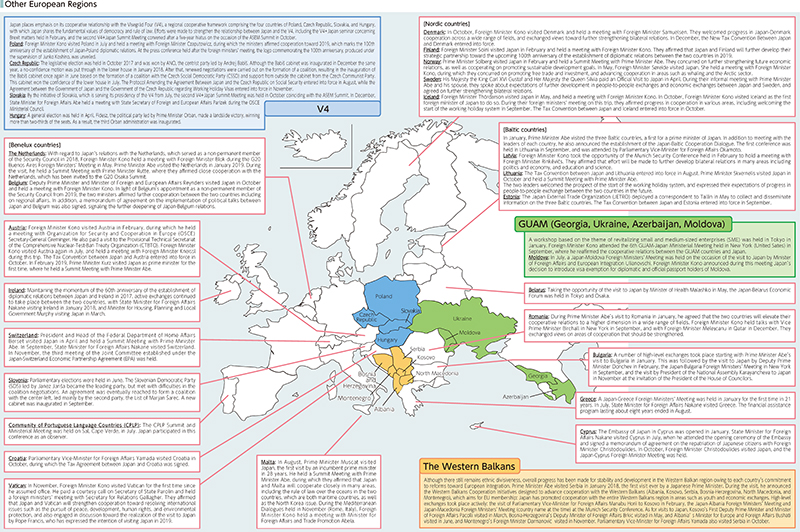Diplomatic Bluebook 2019
Chapter 2
Japan's Foreign Policy that Takes a Panoramic Perspective of the World Map
2 Regional Situations in Europe
(1) European Union (EU)
The EU is a political and economic union consisting of 28 member states with a total population of about 510 million. Sharing fundamental values and principles, the EU is an important partner for Japan in addressing global issues.
(Recent Developments of the EU)
In 2018, the EU has been confronting various challenges continuously since the previous year, including Brexit negotiations, responses to the migration and refugee issue, and the rise of populist forces. Partly because the large amount of time was devoted to addressing these issues, little progress was made in discussions about the future vision of European integration and reform of the EU, which had been gradually growing in momentum since several years ago.
With regard to Brexit negotiations, which commenced in June 2017, challenge was to reach an agreement on framework of their future relationship while avoiding the building of a physical barrier between the Republic of Ireland and Northern Ireland, which holds the only land border between the UK and the EU. However, negotiations on matters including measures to maintain an open border did not go smoothly, and there was no prospect of reaching a conclusion even at the meeting of the European Council (EU Summit Meeting) held in October, which had been set as the target deadline for concluding negotiations. An agreement was finally reached on the draft withdrawal agreement on November 14 between the negotiators. Thereafter, it was approved by the British Cabinet, and then by the EU27 excluding the UK on November 25 at the special meeting of the European Council. On the other hand, the House of Commons of the UK rejected a motion to approve the withdrawal agreement in January 2019, and the situation where a concrete breakthrough solution has not found was continued before the scheduled date for the UK to leave the EU at the end of March.
With regard to the migrant and refugee issue, the number of arrivals into the EU fell to an even lower figure than the previous year. However, discussions suggesting that the EU's refugee protection system is not necessarily functioning effectively came under the spotlight once again, with examples such as Italy's refusal to allow boats carrying refugees to enter its ports, and confrontation in Germany over the movement of refugees who first enter other countries in the EU to Germany.
In the area of security, moves to strengthen cooperation within the EU continued to be observed in 2018 from the previous year. In the Permanent Structured Cooperation (PESCO), a defense cooperation framework under the Treaty on European Union established in December last year, decisions were made to implement a total of 34 projects in 2018.
The EU also demonstrated growing interest in Asia and took an approach toward strengthening cooperation in a wide range of areas, with the adoption of a document titled “Deepening EU security cooperation with Asian partners” by the Foreign Affairs Council held in May, and the issuance of “EU Strategy on Connecting Europe and Asia” in September.
On the economic front, economic growth rate of the Eurozone for 2018 fell below that of 2017, when it achieved the highest growth rate on record in the past decade. Nevertheless, it continued to stay strong even after the first half of the year.
<Japan-EU Relations>
In 2018, Japan and the EU achieved historical progress to strengthen mutual relations, as marked by the signing of the Japan-EU EPA and Japan-EU SPA at the 25th Japan-EU Summit held in July. The Japan-EU EPA and SPA were adopted by the Diet of Japan in December, and obtained the consent of the European Parliament during the same month. As a result of the mutual notification between Japan and the EU on the completion of domestic procedures within the year, the Japan-EU EPA entered into force while the application of some provisions of the SPA were commenced on February 1, 2019.
In addition to the Japan-EU Summit in July, Prime Minister Abe also took the opportunity of the 12th ASEM Summit in Brussels, Belgium in October and the G20 Buenos Aires Summit in November to hold Japan-EU leaders' meetings, where he exchanged opinions with EU leaders on Japan-EU relations, Brexit, and global economy and trade, among other topics. He consistently requested that transparency and predictability in the Brexit process, as well as legal stability be ensured through the establishment of a transition period, so as to minimize adverse impacts of Brexit on Japanese corporations and the global economy. Close dialogues were also held between the Foreign Ministers. Dialogues between Japanese and EU foreign ministers were also held during the Brussels conference on “Supporting the future of Syria and the region” in April and the ASEAN-related Foreign Ministers' Meeting in August, and a total of four telephone conferences were held.
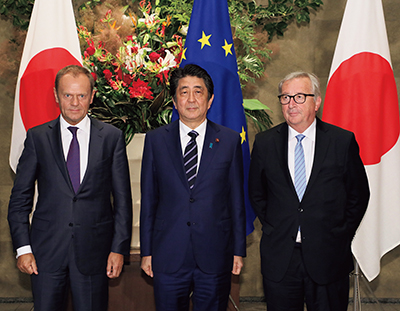 25th Japan-EU Summit (July 17, Tokyo; Photo: Cabinet Public Relations Office)
25th Japan-EU Summit (July 17, Tokyo; Photo: Cabinet Public Relations Office)On the economic front, dynamic efforts were put into coordinating the entering into force of the Japan-EU EPA in 2018. In April, Foreign Minister Kono held a dialogue with European Commissioner for Trade Malmström, during his trip to Brussels, where he affirmed mutual cooperation toward the early entering into force of the same agreement. After the agreement was signed at the Japan-EU Summit in July, a delegation of the European Parliament's Committee on International Trade visited Japan in September. They paid a courtesy call on Foreign Minister Kono and Special Advisor to the Prime Minister Miyakoshi, and affirmed their commitment to cooperating toward the early adoption and entering into force of this agreement. European Commission Vice-President Katainen visited Japan in October, and the first Japan-EU High Level Industrial, Trade and Economic Dialogue was held (Co-chairs from the Japan side: Foreign Minister Kono and Minister for Economy, Trade and Industry Seko. Chair from the EU side: Vice-President of the European Commission Katainen). In addition to exchanging views on challenges faced by Japan and the EU in areas such as international trade, energy, environment, investment and digital economy, both sides affirmed their commitment toward the early entering into force of the Japan-EU EPA.
(2) United Kingdom
There has been continued disagreement within the UK concerning the direction of Brexit, and the political situation remains unstable, with a number of ministers resigning in protest against the government's Brexit policy. In July after the Cabinet approved the negotiations policy on future relations with the EU, Secretary of State for Foreign and Commonwealth Affairs Johnson and Brexit Secretary Davis resigned. Furthermore, in November after the UK and EU had concluded their negotiations and the Cabinet had approved the draft withdrawal agreement and the political statement on future relations, further four members including Brexit Secretary Raab and other Ministers of State resigned. In January 2019, the UK Parliament rejected the motion to approve the withdrawal agreement with a historic majority. On the other hand, the vote of no confidence submitted to the government was opposed by all the ruling parties and rejected. Thereafter, some newly submitted motions including about a renewed discussion with the EU on the Irish border was carried at the Parliament. However, as of January 2019, the outlook on the situation remains unclear.
The situation on Brexit negotiations are impacting the economy in the form of uncertainty risks. The UK Office for National Statistics has forecasted economic growth rate for 2018 to be 1.4%, the lowest in the past six years. Unemployment rate in October, at 4.1%, reached the lowest level since the mid-1970s, but growth in real wages s stays stagnant. Inflation rate for 2017 was 2.7%, the highest since 2013, while policy interest rate was raised to 0.75% in August 2018.
Both Japan and the UK have strengthened the bilateral relations through policy cooperation and mutual exchange at various levels, including summit and ministerial-levels. Prime Minister Abe and Prime Minister May held summit meetings during the G7 Charlevoix Summit, Canada, in June 2018 and G20 Buenos Aires Summit, Argentina, from November to December. Furthermore, in January 2019, Prime Minister Abe visited the UK and held a summit meeting with Prime Minister May. The two leaders affirmed that Japan-UK relations had made significant progress after Prime Minister May's visit to Japan in August 2017, and looking ahead to the challenges and opportunities for the next ten years, issued the “UK-Japan Joint Statement.” They also concurred that the two countries should play a leadership role at the G20 and other forums, as well as strengthen cooperation toward achieving a “Free and Open Indo-Pacific” and maintaining and expanding an open free trade system based on rules. Prime Minister Abe also requested to Prime Minister May that the UK should avoid a “no-deal Brexit.”
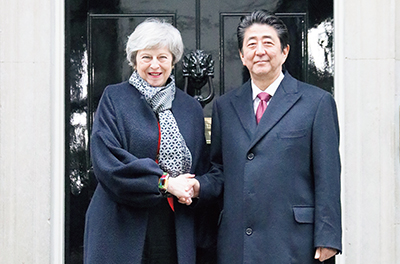 Japan - UK Summit Meeting (January 10, 2019, London, UK; Photo: Cabinet Public Relations Office)
Japan - UK Summit Meeting (January 10, 2019, London, UK; Photo: Cabinet Public Relations Office)Foreign Minister Kono and Secretary of State for Foreign and Commonwealth Affairs Johnson held a Foreign Ministers' Meeting during the G20 Buenos Aires Foreign Ministers' Meeting, Argentina, in May. In September, Secretary of State for Foreign and Commonwealth Affairs Hunt visited Japan and the two ministers held the Seventh Japan-UK Foreign Ministers' Strategic Dialogue.
In the area of security and defense, the British Royal Navy frigate “HMS Sutherland” and the amphibious assault ship “HMS Albion” called at port in Japan in April and August respectively, and carried out joint exercises in southern waters of Kanto with the Japan Maritime Self-Defense Force (MSDF) . The British Royal Navy frigate “HMS Argyll” also participated in a joint exercise with the MSDF in the Indian Ocean in September. In May, the British Royal Navy frigate “HMS Sutherland” engaged in monitoring and surveillance activities on illegal maritime activities, including ship-to-ship transfers by North Korean vessels, and Japan and the UK cooperated through the mutual exchange of information and in other ways. In October, a joint exercise between the ground forces of Japan and the UK was held in Japan, marking the first such bilateral ground exercise apart from Japan-U.S. exercises, and a Japan-UK-U.S. joint exercise in southern waters of Honshu was held in December. These exercises demonstrated progress in Japan-UK security and defense cooperation in their relationship as the closest security partners in Asia and Europe. In the area of cooperation on defense equipment and technology, the two countries have continued to make progress in cooperation, such as the launch in February of a cooperative research project on the certification process for jet engines.
With regard to culture, Japan House London opened in June, and the Grand Opening event was held in September. This was attended by Prince William, the Duke of Cambridge, and Deputy Prime Minister Aso from Japan (See Chapter 3, Section 4(1)). Preparations are also moving ahead for the intensive implementation of a wide range of Japan-related events in 2019 and 2020, designated “Japan-UK Season of Culture” to serve as a bridge linking two major sporting events─the Rugby World Cup 2019 and the 2020 Tokyo Olympic and Paralympic Games, as set out in the Japan-UK Joint Declaration on Prosperity Cooperation issued during the visit by Prime Minister May to Japan in August 2017.
(3) France
In May 2017, President Macron, who has been rallying for the unity of the traditionally divided right-wing and left-wing groups, assumed office as the President of France. Backed by a stable majority in the National Assembly, he promoted reforms on domestic issues. Although he produced a certain degree of results, including improving unemployment rate and fulfilling the requirement of keeping the budget deficit below 3% of the GDP for the Eurozone countries, his approval ratings fell for reasons such as opposition to his reforms as represented by the “yellow vests movement,” and successive resignations by key ministers. The Macron administration's reform faces a crucial moment.
The specific domestic reforms that he had addressed include the enactment of the SNCF (Société Nationale des Chemins de Fer, the national rail of France) reform bill in June, which covers the incorporation of SNCF and reviews of the privileges granted to employees of the rail company, reform of institutions, which primarily involve reform of the parliamentary system, pension system reform, medical system reform, and action plans for corporate growth and innovation. With respect to external affairs, President Macron actively made visits abroad, including visits to China and the U.S. in January and April respectively as a state guest. In November, a ceremony commemorating the 100th anniversary of the end of World War I was held in Paris, and was attended by the heads of state of more than 70 countries (Deputy Prime Minister Aso attended as the Japanese representative). President Macron continued to raise the banner for multilateralism, and exerted his leadership in promoting EU integration as well as addressing climate change and commerce and trade issues.
As for Japan-France bilateral relations, 2018 marked the 160th anniversary of diplomatic relations between the two countries. Based on a decision between the both governments, a large-scale project featuring Japanese culture, titled “Japonismes 2018,” was held from July 2018 to February 2019 (See Column “160th Anniversary of the Establishment of Japan-France Diplomatic Relations - Spreading Japanese Culture Through ‘Japonismes 2018'”, and Special Feature “Promoting Cultural Diplomacy Through ‘Japonismes 2018'”). With regard to exchanges among key officials, Minister for Europe and Foreign Affairs Le Drian visited Japan in January as a guest of the Ministry of Foreign Affairs of Japan, when he participated in the fourth Japan-France Foreign and Defense Ministers' Meeting (“2 + 2”) and the seventh Japan-France Foreign Ministers' Strategic Dialogue with Minister Kono and other Ministers. During these talks, he expressed that France welcomes an agreement in principle of the Japan-France Acquisition and Cross-Servicing Agreement (ACSA). During the St. Petersburg International Economic Forum (Russia) held in May, Prime Minister Abe held a summit meeting with President Macron, while Foreign Minister Kono visited France on behalf of Prime Minister Abe in July to attend the opening ceremony of “Japonismes 2018” and the Bastille Day parade. On these occasions, foreign minister meetings were held, and the two countries advanced cooperation on security issues, such as with the signing of the Japan-France ACSA with Minister of the Armed Forces Parly. In October, Prime Minister Abe visited France, and together with President Macron, affirmed close cooperation between Japan and France as the respective chairs of G20 (Japan) and G7 (France) in 2019. As a part of the concrete cooperation initiatives put in place by Japan and France to achieve a “Free and Open Indo-Pacific,” a Japan-France maritime seminar was held in Tokyo in December, which encompassed a wide range of maritime policies.
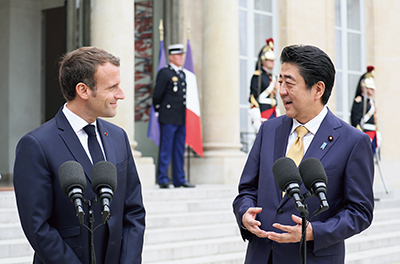 Joint press declaration by the leaders of Japan and France (October 17, Paris, France; Photo: Cabinet Public Relations Office)
Joint press declaration by the leaders of Japan and France (October 17, Paris, France; Photo: Cabinet Public Relations Office)Tsutomu Sugiura, President of Maison de la culture du Japon à Paris
(The Japan Cultural Institute in Paris)
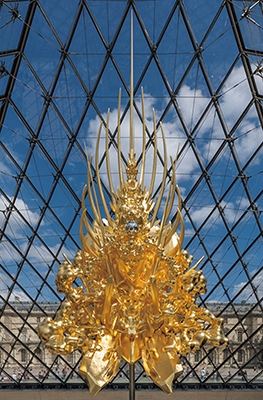 KOHEI NAWA | Throne
KOHEI NAWA | Throne©Nobutada OMOTE SANDWICH
“Japonismes 2018: les âmes en resonance (the Souls in Resonance)” is an exposition of Japanese culture taking place in Paris and other parts of France that could be described as the largest event of its kind in this century. It is being held from July 2018 to February 2019 to commemorate the 160th anniversary of the establishment of Japan-France diplomatic relations. In addition to exhibitions featuring art from ancient to contemporary times, other programs are also being held almost every day. These include performances of “Gagaku” (Japanese court music), “Bunraku” (Japanese puppet theater shows), “Noh” and “Kyogen”, “Kabuki”, contemporary theater, different styles of dances, and “Taiko” (Japanese drumming); programs introducing everyday Japanese culture such as Japanese film features, food culture, and “Zen” culture; and programs introducing the attractions of regional culture such as local festivals.
The event makes us feel as if Paris has been completely transformed into the capital of Japan. The number of participants and visitors for the various programs has exceeded 2.5 million people as of December 31, 2018*. This number includes an estimated 400,000 people who turned up to watch the live illumination of the Eiffel Tower for which His Imperial Highness the Crown Prince pressed the button to unveil the show.
At the same time, the aforementioned number, 2.5 million people, does not include those who saw the massive golden throne sculpture titled “Throne,” produced by Kohei Nawa and installed inside the Pyramid of the Louvre Museum. As visitors in the square and passengers outside are able to view this work day and night, the number of people who have seen it is almost immeasurable.
 Exhibition View, teamLab: Au-delà des limites, 2018, Grande Halle de La Villette, Paris
Exhibition View, teamLab: Au-delà des limites, 2018, Grande Halle de La Villette, Paris©teamLab
Based on my observations, the impact of “Japonismes 2018” can be summarized by the following two points.
Firstly, the general public, ranging from children to grown-ups, gained greater familiarity with Japanese culture. This was most clearly demonstrated in the “Au-delà des limites” exhibition presented by teamLab, and the programs introducing regional attractions such as festivals and dances. The teamLab exhibition is an interactive art featuring projections of digital images such as an 11-meter-high waterfall and water flowing around on the floor, flocks of crows flying on the four walls, and flowers of the four seasons. These projections respond when coming into contact with visitors, with the water splitting around their feet or the grass withering, for example. The exhibition drew crowds of visitors accompanied by children from as early as the day of the sneak preview. For this reason, the preview had 2,000 visitors for the 1,000 guests originally invited. As for regional attractions, the Tachineputa Festival of Aomori Prefecture, the On Matsuri Festival of Nara Prefecture, the Shingen-ko Matsuri Festival of Yamanashi Prefecture, as well as the Awa-odori dance of Tokushima Prefecture and the Sansa-odori dance of Iwate Prefecture, were held at the spacious Jardin d'Acclimatation located in Bois de Boulogne. These festivals drew 60,000 people over three days, filling the park with immense crowds. A lot of French visitors were putting their children on their shoulders to see the festivities here and there.
Secondly, “Japonismes 2018” became the talk of the town even among intellectuals. At the November convention of the Institut de France, whose membership comprises the most prominent intellectuals, Mr. Jean-Robert Pitte, Permanent Secretary of the French Académie des Sciences Morales et Politiques, delivered a 30-minute special lecture on the history of Japan, and touched on “Japonismes 2018” at the beginning of his lecture. Even members of the institute who were not usually familiar with Japan remarked that the lecture gave them a good understanding of Japan. It also seemed to have stirred their interest in the programs of “Japonismes 2018.”
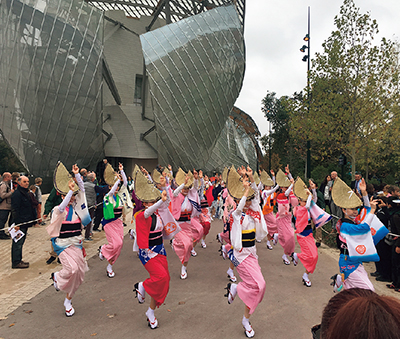 Vitality of Local Cultures and Matsuri
Vitality of Local Cultures and MatsuriAlthough these are just a few of the examples, there is no doubt that Japanese culture has spread widely among the citizens of France at an unprecedented scale. As Mr. Pitte said in the closing of his lecture, “the Japanese people know France better than the French people know Japan. The time has come to restore the balance (through “Japonismes 2018”), and we, académie, can and should contribute to the restoration of that balance”.
- * By the point of the closing ceremony in February 2019, the number of visitors had exceeded 3 million.
(4) Germany
In Germany, confrontation within the federal grand coalition (Christian Democratic Union (CDU), Christian Social Union (CSU), and Social Democratic Party (SPD)) surfaced after summer over issues such as response to the migrant issue and personnel matters related to the head of the Federal Office for the Protection of the Constitution. With the support rate for the ruling coalition party falling under such circumstances, state elections were held for Bavaria (October 14) and Hesse (October 28). In the Bavarian state elections, the independent ruling party CSU saw a significant decline in the percentage of votes it gained (from 47.4% in the last elections to 37.2%), while Alternative for Germany (AfD), which advocates an anti-refugee policy, received double-digit votes (10.2%). In the Hesse state elections, the CDU retained its position as the leading party, but along with the SPD, saw the percentage of its votes fall by more than 10% from the last elections. The percentage of votes received by AfD reached a double-digit figure (13.1%), gaining it entry into the parliament of the state of Hesse. As a result, the party was able to advance into all parliaments, including the federal parliament (Bundestag).
On the day after the Hesse state elections (October 29), Chancellor Merkel (leader of the CDU) announced that she will not be standing for the next elections of party leader, a position that she had been holding since 2000, in response to the results of these state elections. (However, she announced at the same time that she will stay on as Chancellor for this parliamentary term lasting till 2021.) In light of this, three CDU members announced their candidacy for the elections of the CDU party leader─CDU Secretary-General Kramp-Karrenbauer, former chairman of the CDU/CSU parliamentary group Merz, and Federal Minister of Health Spahn. On December 7, at the elections for party leader held during the CDU's Congress in Hamburg in the northern part of Germany, CDU Secretary-General Kramp-Karrenbauer ran a close race in the voting with former chairman of the CDU/CSU parliamentary group Merz, but eventually emerged as the new leader of the CDU.
As for Germany's relations with Japan, Federal Minister for Foreign Affairs Maas, who assumed office in March, visited Japan in July as the first stop of his first tour of Asia as foreign minister. During his visit, he held a foreign ministers' meeting with Foreign Minister Kono, and paid a courtesy call on Prime Minister Abe. In September, Foreign Minister Kono visited Germany. On this occasion, he paid a courtesy call on Chancellor Merkel, and attended a parliamentary group meeting of the ruling party CDU/CSU. He explained Japan's position on issues such as the East Asia situation and the international economic system, and spoke about the importance of furthering the close cooperation between Japan and Germany, both of which have developed as peace-loving nations under a free and open international order after the war, so as to maintain and strengthen international order based on rules. Thereafter, a Japan-Germany Summit Meeting was held on the occasion of the ASEM Summit in Brussels in October. In February 2019, Chancellor Merkel visited Japan for the first time in four years, not to attend any international conferences, but in the context of bilateral relations. During her trip, she held a Japan-Germany Summit Meeting with Prime Minister Abe.
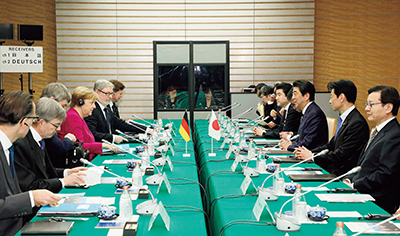 Japan-Germany Summit Meeting (February 4, 2019, Tokyo; Photo: Cabinet Public Relations Office)
Japan-Germany Summit Meeting (February 4, 2019, Tokyo; Photo: Cabinet Public Relations Office)
Did you know that 2018 marked the 100th anniversary of the first full performance of Beethoven's Ninth Symphony, which has become a tradition of the year-end season in Japan?
During the First World War, some German soldiers taken captive by Japanese troops in Qingdao of China, a concession of Germany, were held at the Bando Prisoner-of-war Camp in today's Naruto City, Tokushima Prefecture. The Head of the Camp, Toyohisa Matsue, treated German soldiers humanely at the camp and let them interact with local residents through cultural, art, and sports activities. The knowledge and techniques for vegetable farming, livestock raising, dairy products and bread baking possessed by the German soldiers spread to the area via their exchanges with the local residents. Local residents called the German soldiers “Doitsu-san” (with “Doitsu” meaning “Germany” in Japanese) with a sense of familiarity. The movie “Ode an die Freude” starring Ken Matsudaira illustrates such exchanges. One hundred years ago, the orchestra formed by German soldiers at this camp performed the Ninth Symphony in full score for the first time in Japan.
The Governments of Japan and Germany named the year 2018 “DAIKU2018” to commemorate the 100th anniversary of the first performance of the Ninth Symphony (known as “daiku” in Japanese) in Japan. They approved commemorative projects related to the Ninth Symphony in the two countries and have promoted exchanges and mutual understanding between Japan and Germany through the Ninth Symphony.
In June 2018, as part of the commemorative events, the Japan Ground Self Defense Force's (JGSDF) Central Band visited Germany and held a concert to perform the Ninth Symphony at the Japanese Ambassador's residence in Germany, inviting descendants of the former German soldiers and their families. One of the family members in attendance offered to donate a sketch collection (lithographic printing) made by a German soldier. The research on the sketch collection revealed that these sketches were a precious historical resource, not even possessed by the German House in Naruto City that has many historical documents related to the Bando POW Camp. With the family's consent, these sketches were donated to the Naruto German House. These sketches made at the Bando POW Camp found their way back “home” to Naruto, Tokushima after 100 years, thanks to the Ninth Symphony.
The sketch collection depicts a race walk event watched by local residents and a lively image of German soldiers playing billiards, shedding light on their exchanges with local residents and life at the POW camp. Japan hopes that the “return home” of these sketches will contribute to mutual understanding and further advancement of friendly relations between Japanese and German people.
 From sketch collection: Race walk scene
From sketch collection: Race walk scene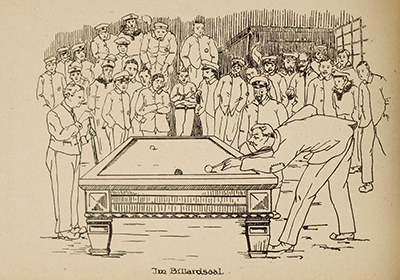 From sketch collection: German soldiers playing billiards
From sketch collection: German soldiers playing billiards(5) Italy
Following the general election held in March, a coalition government led by Prime Minister Conte and comprising the Five Star Movement and the League was formed in June. The new government is tackling the priority issues raised in its manifesto, including measures related to the domestic economy, social security, and migrant.
In June, Prime Minister Abe held the first Japan-Italy Summit Meeting with the newly appointed Prime Minister Conte, on the sidelines of the G7 Charlevoix Summit, during which they exchanged views on the response to the regional situation and global issues. The two leaders also held a summit meeting during the ASEM Summit in October. Foreign Minister Kono and Minister of Foreign Affairs and International Cooperation Moavero Milanesi held a foreign ministers' meeting on the sidelines of the UN General Assembly in September. The two countries, which are members of the G7 and share fundamental values, affirmed to continue close cooperation. Furthermore, in November, a foreign ministers' meeting was also held during Foreign Minister Kono's visit to Italy to attend the Mediterranean Dialogues.
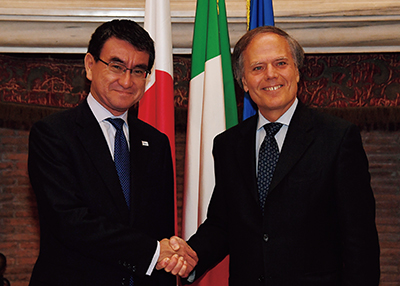 Japan-Italy Foreign Ministers' Meeting (November 23, Rome, Italy)
Japan-Italy Foreign Ministers' Meeting (November 23, Rome, Italy)(6) Spain
In June, a motion of no confidence in the government of Mariano Rajoy's People's Party was passed, and at the same time, Pedro Sánchez, Secretary-General of the Spanish Socialist Workers' Party (PSOE) assumed office as Prime Minister.
2018 marks the 150th anniversary of the establishment of diplomatic relations between Japan and Spain, and many commemorative events were held in the two countries. In January, State Minister for Foreign Affairs Nakane visited Madrid and attended the opening ceremony for the 150th anniversary celebrations. He also held a meeting with Minister of Foreign Affairs and Cooperation Dastis. In October, Prime Minister Abe visited Spain. During the visit, he had an audience with His Majesty King Felipe VI and held a summit meeting with Prime Minister Sánchez, where the two leaders concurred on elevating bilateral relations between Japan and Spain to a “strategic partnership.” Taking the opportunity, the New Tax Convention between Japan and Spain was signed. In November, the 20th Japan-Spain Symposium was held in Yamaguchi City themed on “Beyond the 150th Anniversary of the Establishment of Diplomatic Relations between Japan and Spain.”
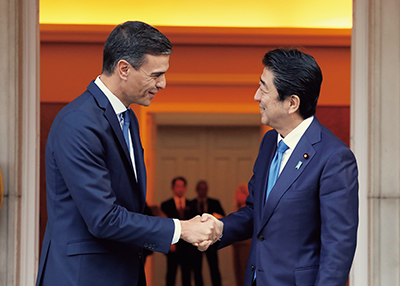 Prime Minister Abe exchanging a handshake with Prime Minister Sánchez of Spain (October 16, Madrid, Spain; Photo: Cabinet Public Relations Office)
Prime Minister Abe exchanging a handshake with Prime Minister Sánchez of Spain (October 16, Madrid, Spain; Photo: Cabinet Public Relations Office)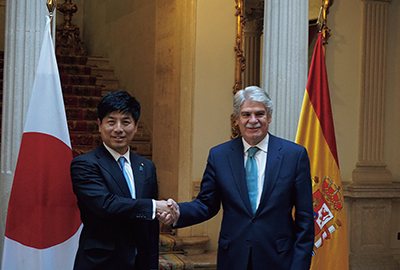 Meeting between State Minister for Foreign Affairs Nakane and Minister of Foreign Affairs and Cooperation Dastis of Spain (January 16, Madrid, Spain)
Meeting between State Minister for Foreign Affairs Nakane and Minister of Foreign Affairs and Cooperation Dastis of Spain (January 16, Madrid, Spain)(7) Ukraine
In November, three Ukrainian Navy vessels attempting to navigate through waters near the Kerch Strait, in the eastern part of the Crimean Peninsula, were captured by the Border Service of the Russian Federation. In response, the Ukrainian government imposed martial law for 30 days in some parts of the country, and there were heightened tensions between the two countries. Various countries, particularly in Europe and America, expressed their concerns over this situation, and called for restraint and calm.
In the eastern part of Ukraine, the situation remains unstable as a result of the failure to fulfill the ceasefire agreements. By the end of August, Alexander Zakharchenko, the “head of state” of the self-proclaimed Donetsk People's Republic that has been occupied by separatist militants, was assassinated by terrorists. In response, an “election” was held in the occupied territory in the east in November. Japan and other countries in Europe and America do not acknowledge the legitimacy of this “election” as it was not carried out based on an agreement between the relevant parties, including agreements on local elections in the occupied territory in the east (Minsk Agreements). No significant progress has been achieved in talks over implementation of the Minsk Agreements among the nations concerned.
With regard to internal affairs, various reforms have been ongoing under the Groysman Cabinet formed in April 2016. Against this backdrop, a law on the establishment of the High Anti-Corruption Court of Ukraine was adopted in June. During the same month, the Ukraine Reform Conference was held in Copenhagen, Denmark, and was attended by many high-level officials from Europe and America. In addition to discussing the status of reforms in Ukraine, the respective countries also announced that they will continue to support efforts in this regard. Parliamentary Vice-Minister for Foreign Affairs Horii attended the meeting as Japan's representative. In his speech, he praised the outcomes of reforms in Ukraine so far, but appealed for the continued need for reforms, as well as confirmed Japan's continued support toward Ukraine's reform efforts.
With regard to bilateral relations, the Ukraine-Japan Bilateral Consultations on Security Issues were held in October in Tokyo as a new initiative. In January, Japan also decided to provide additional support of about 396 million yen (3.6 million US dollars) to support reform efforts and the stabilization of Ukraine.
